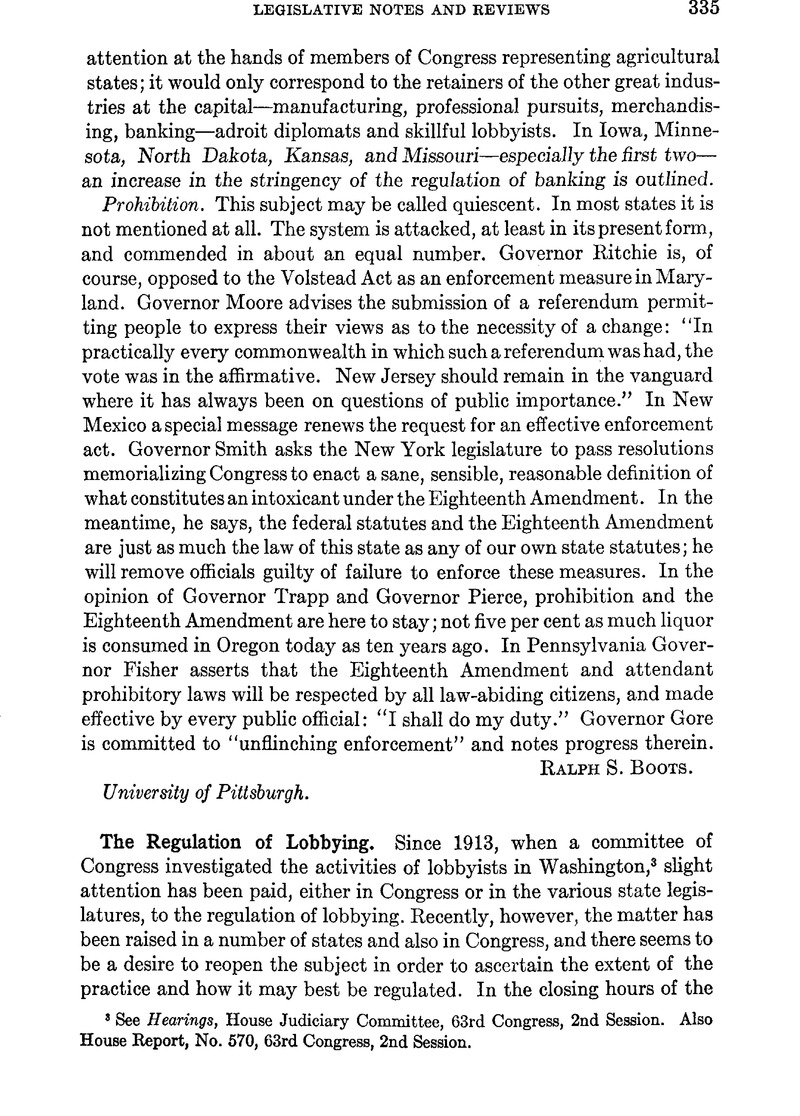Published online by Cambridge University Press: 02 September 2013

3 See Hearings, House Judiciary Committee, 63rd Congress, 2nd Session. Also House Report, No. 570, 63rd Congress, 2nd Session.
4 Congressional Record, vol. 68, p. 5681 (March 4, 1927).
6 Inaugural address, January, 1927.
7 Literary Digest, LXVII, 58–60 (Oct. 30, 1920), has a list of the lobbyists in Washington. In Kent, Frank R., The Great Game of Politics, 271Google Scholar, there is an interesting discussion of the activities of these lobbyists.
7 He says: “To manipulate legislation at Washington nowadays one does not waste time on personal appeals to memhers of Congress or in interviewing nominal leaders of the House and the Senate. Rather he seeks out the legislative agents of a few powerful occupational groups, and if he can interest them, his work is accomplished.” Century Magazine, CIII, 869–876 (April, 1922).
8 An interesting refinement of the practice of lobbying was used by the Standard Oil Company of Indiana in combatting the gasoline business conducted for a time by the state of South Dakota. The company adopted a method of open advertising to the citizens, running its campaign in 120 South Dakota daily and weekly newspapers in order to present its own side of the case, and also, incidentally, the case for its competitors, i.e., the 194 other privately owned companies which did business in the state. See Printers' Ink, Oct. 1, 1925, pp. 113–116.
9 See Lalor's Encyclopaedia, II, 778. Also Roosevelt, Theodore, American Ideals, 63–66.Google Scholar Also Reinsch, , Readings on American State Government, 79–84Google Scholar, for Governor Russell's and Governor LaFollette's messages to their respective legislatures on the subject of lobbying. Georgia had a law on lobbying as early as 1877.
10 Sen. Doc. No. 51, 50th Congress, 1st Session, gives a description of the Pacific Railway lobby.
11 Testimony before the Legislative Insurance Investigating Committee of New York, II, 1925, ff.
12 These states are as follows: Alabama, Arizona, California, Connecticut, Florida, Georgia, Idaho, Indiana, Kansas, Kentucky, Louisiana, Maine, Maryland, Massachusetts, Mississippi, Missouri, Montana, Nebraska, New Hampshire, New York, North Dakota, Ohio, Oklahoma, Oregon, Rhode Island, South Dakota, Tennessee, Texas, Utah, Virginia, West Virginia, and Wisconsin.
13 Several other states, such as Pennsylvania and Arkansas, have laws penalizing the bribery of legislators, but these laws do not regulate the activities of legislative agents, and hence cannot be called lobbying laws. See Pennsylvania Statutes, Supplement, 1924, Sec. 13850 a–8; and Digest of Statutes of Arkansas, 1921, sees. 2569, 2570.
14 The following states require registration: Georgia, Indiana, Kansas, Kentucky, Maine, Maryland, Massachusetts, Mississippi, Nebraska, New Hampshire, New York, Ohio, Oklahoma, Rhode Island, South Dakota, and Wisconsin.
15 The following states require the filing of expense accounts: Georgia, Indiana, Kentucky, Maryland, Massachusetts, Mississippi, Nebraska, New Hampshire, New York, Ohio, Rhode Island, South Dakota, and Wisconsin.
16 The following states prohibit contingent compensation: Georgia, Indiana, Kansas, Kentucky, Maine, Maryland, Massachusetts, Mississippi, Nebraska, New York, Ohio, Rhode Island, South Dakota, and Wisconsin.
17 Indiana Annotated Statutes, 1926, Sec. 8115; and Wisconsin Statutes, 1919, vol. 2, sec. 4482.
18 In his message to the California legislature in 1923 Governor Richardson suggested the passage of a law preventing state employees from exerting undue influence upon the members of the legislature.
19 General Laws, 1921, vol. 1, Chap 3, secs. 39–50.
20 Compiled Laws, 1917, sec. 7949.
21 Barnes' Code, 1923, Ch. 12, secs. 19a (1)–(4).
22 In Michigan, where the governor is recommending legislation to regulate lobbying, both houses have for years passed rules which prohibit persons other than legislators and state officials from having access to the floors of the two houses. See House Rule 2 and Senate Rule 74. Other state legislatures have similar rules, but they are not enforced.
23 California Penal Code, 1923, secs. 85, 89; and Montana Revised Code, 1921, secs. 10838, 10846.
24 The penalties provided in the various state laws include both fine and imprisonment. Fines range from $50 to $5,000, and imprisonment ranges from ten days in Missouri to twenty years in Montana.
25 A complete study of the operation of anti-lobbying laws would necessitate visiting thirty-two states. These three states appear typical.
26 In Missouri at a recent session only five lobbyists registered. Mathews, , American State Government, 202n.Google Scholar For California see National Municipal Review, XII, 375–376.
27 See my Party Campaign Funds, Chap. VIII, for a description of the ineffectiveness of state corrupt practices acts.
28 See provisions of the Maryland law giving this power to the governor. Annotated Code, vol. 1, Art. 40, secs. 4–15.
29 The Michigan legislature recently struggled with this question for a week with out arriving at any satisfactory conclusion. Finally they procured what they called a “treatise” on the subject and appeared to satisfy themselves with the definition contained therein, namely, “persons frequenting halls of legislation with a view to influencing legislation; any one who hangs around seeking to influence members.”
30 See Indiana Annotated Statutes, 1926, sec. 8108, for a careful definition of terms.
Comments
No Comments have been published for this article.